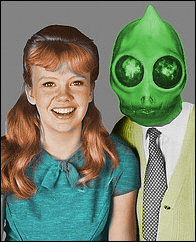With Planet Comics #62 (September 1949) it clear that tastes in science fiction have changed. What the book depicted and what the public was given was diverging with each passing month. The 1950s are just around the corner and the lurid adventure pulps are being steadily replaced in the marketplace. Not for the first time, print is considered a dying medium. Movies and particularly television are capturing more and more of the nation's free time.
Creativity, in spite of any opportunities the new medium promised, were compromised by the limits of budget, technology and corporate sponsorship. No longer was it enough to sell a story, a story was required to sell a product. It was salesmen, not editors or writers or artists, who were in creative positions. It was not enough for Flash Gordon to sell the book his image graced he also had to ensure a substantial market share of breakfast cereals, batteries and special edition bicycles.
While it was evident the entire Fiction House line was different in how they portrayed their heroes, particularly the female characters, it didn't matter one whit to parent groups and politicians. One comic book was just like another and they were all targeted due to panic, fear and misinformation. Fiction House would tweak the Planet Comics format a few more times trying to keep up with market preferences but the experiment was coming to an end. The entire company didn't survive much into the 1950s.
In this chapter of the Futura Saga the protagonist once again fights oppression with mixed results for her followers. Readers back then were not expected to care if thousands of bad guys die as the result of the hero tampering with the Atomo-Ray. If they did, the creators did not give their audience enough credit and rarely offered them the opportunity to become invested in the antagonists. As progressive as some of the Fiction House characters were they were clearly super-heroes who could do no wrong. For the most part it was a black and white universe even as it was rendered in four colors. It is Futura that existed in a perpetual state of anarchy and she took advantage of her surroundings for her benefit and sometimes the benefit of others, though rarely the end result was a positive one. For good or ill this is what made the fictional character just a bit more real than her spandex-clad peers.
More collateral damage in the next thrilling chapter!
Wednesday, July 14, 2010
Futura - Chapter 20
Posted by
Sleestak
at
7/14/2010 06:00:00 AM
![]()
![]()
Labels: futura, planet comics, women in science fiction
Subscribe to:
Post Comments (Atom)


























No comments:
Post a Comment
Moderation enabled only because of trolling, racist, homophobic hate-mongers.
Note: Only a member of this blog may post a comment.